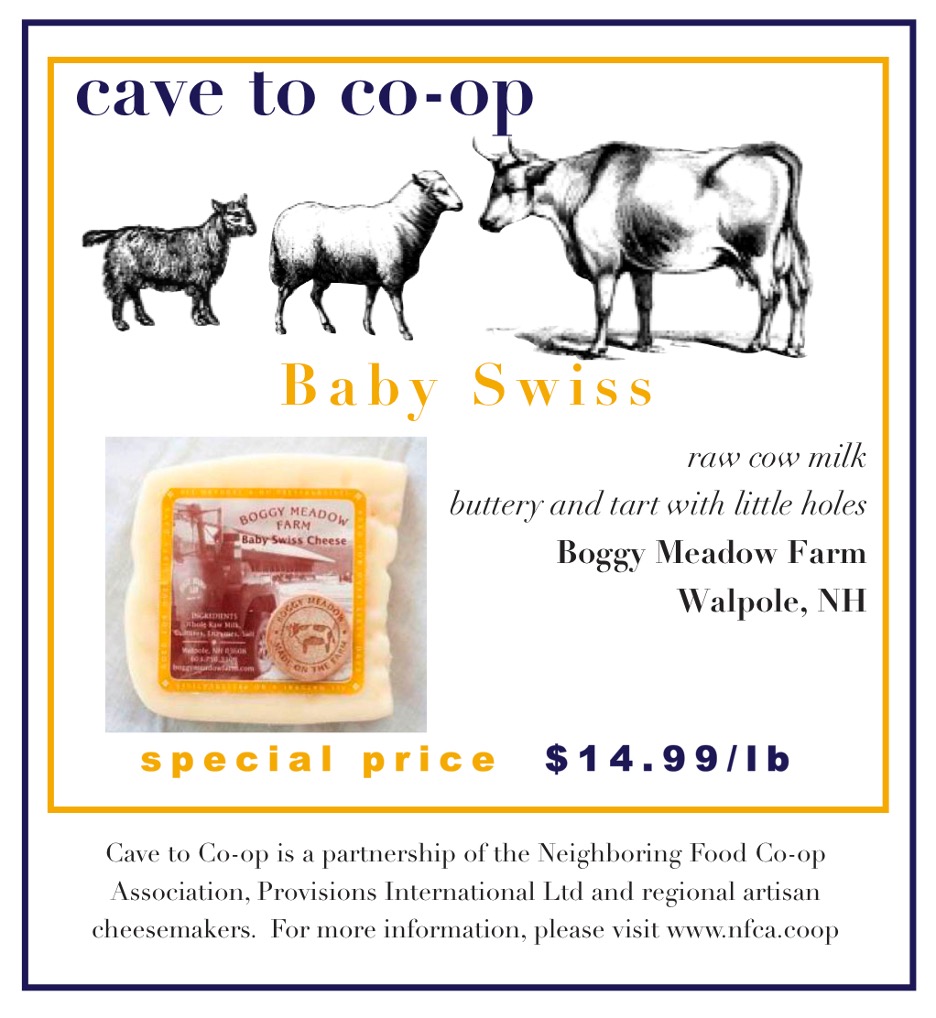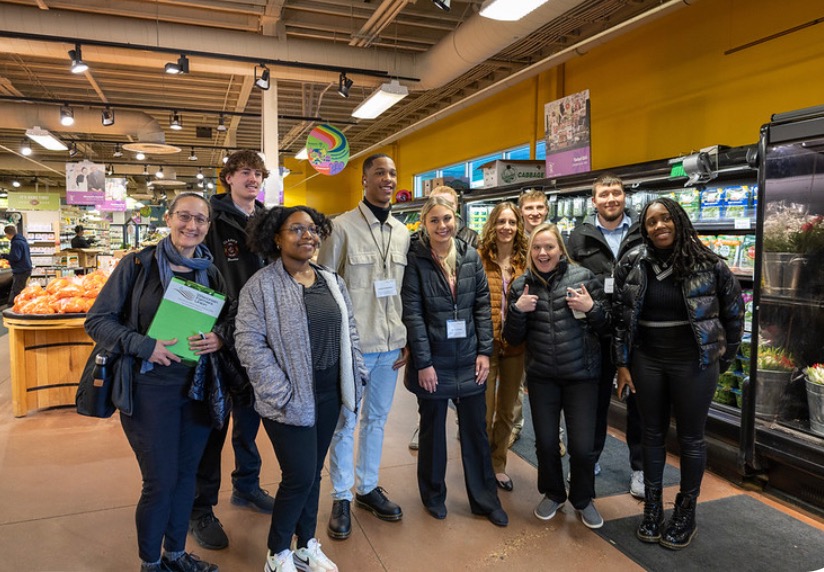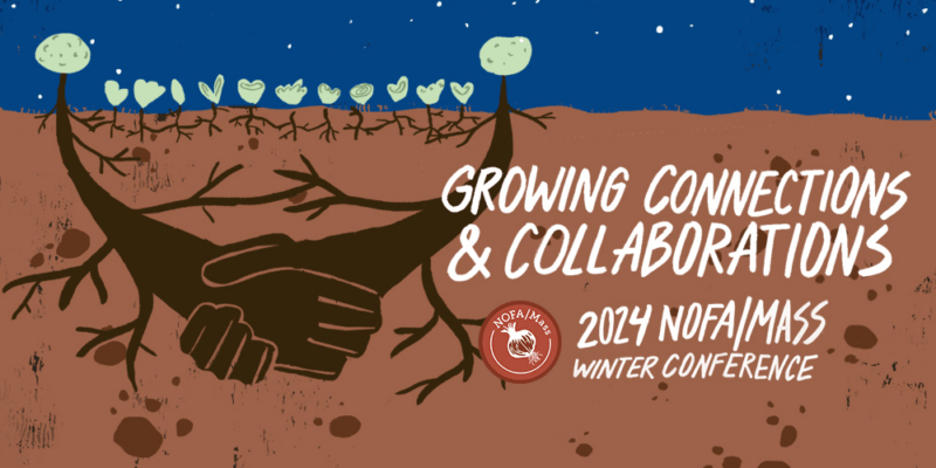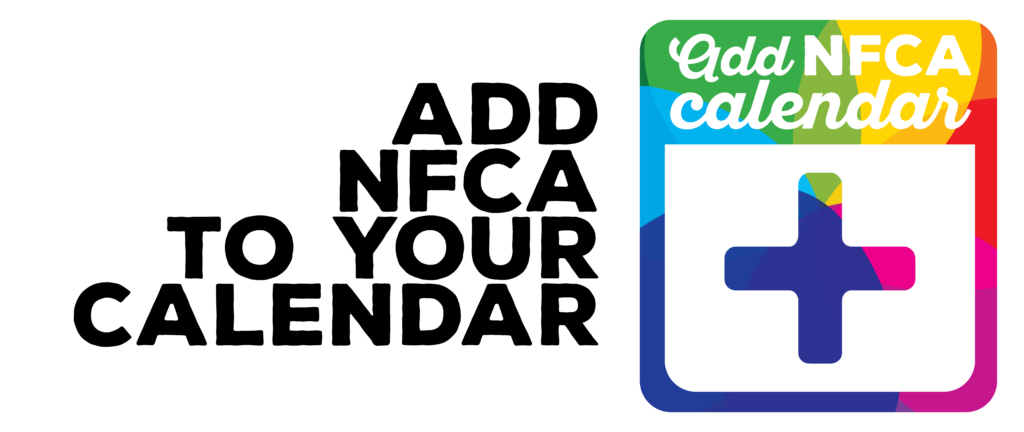
Was this newsletter forwarded to you? Subscribe here to keep up to date on NFCA News!
In this edition:
A Co-operative New Year!

As we welcome the New Year, our food co-ops are continuing our work of growing a more healthy, just, and sustainable regional food system and an inclusive economy that works for everyone.
Rooted in the Principle 6 of the Co-operative Identity, the Neighboring Food Co-op Association (NFCA) is a co-operative established by community grocery co-ops across the Northeast U.S. to provide opportunities for collaboration, innovation, and mutual support. Over the past year, we’ve worked together to support the shared success of our members through peer networking and innovation, promoting our collective impact, providing training and development, and working with organizational partners to grow the co-operative economy. We also contributed to the International Co-operative Alliance (ICA) Consultation on the Co-operative Identity, joining with the National Cooperative Business Association (NCBA CLUSA) and other partners to engage our global movement in a dialog on the relevance of our Values and Principles to the challenges of our times and the opportunities to build a more just, sustainable, and inclusive food system and economy.
As we begin a New Year, we’re building on our core mission of peer networking, collaboration, and innovation for shared success. We’ll be gathering for our 13th Annual Meeting in March, and with national elections coming up this fall, we’re excited to expand our partnership with CoBank and the New England Farmers Union (NEFU) to engage in policy advocacy on the issues that affect our food system, communities, and economy. We’re particularly excited to welcome co-operators from across the country to CCMA, the national food co-op conference, hosted by Portland Food Co-op in Maine, May 30 – June 1.
This year will also be an opportunity to look forward, laying the groundwork for the second International Year of Co-ops coming up in 2025. Proclaimed by the United Nations General Assembly in November, the celebration will be an opportunity to promote the contribution of co-operatives to the UN’s “Agenda for Sustainable Development,” which concludes in 2030. A plan of action for “people, planet and prosperity,” the agenda include 17 Sustainable Development Goals (SDGs), many of which are directly relevant to co-operatives. For example, the resolution recognizes the role of co-ops in building a more inclusive economy, addressing climate change, and contributing to food security.
The resolution also highlights the recommendations of the 2023 UN Secretary General Report on Co-operatives in Social Development, which calls on governments to support co-ops as sustainable enterprises that contribute directly to good jobs, hunger alleviation, and financial inclusion. Toward this end, it further recommends reviewing existing legislation and regulations to ensure that the legal and regulatory environment is in alignment with the Co-operative Identity and conducive to the creation and growth of co-operatives by improving existing laws and/or by establishing new ones. Over the years, this has been an area of concern for the NFCA, reflected in our Resolution on the Co-operative Legal Identity, as well as efforts to challenge laws not in alignment with Co-operative Principles and updating outdated statutes impeding co-operative development.
The NFCA’s core vision is as relevant as ever as we work together for thriving co-operative economy, rooted in a healthy, just and sustainable regional food system and a vibrant community of co-operative enterprise. Here’s to a Co-operative New Year!
Rural Food Co-ops Matter

Staff member Bri Spinhirn is enthusiastic about their Co-op Information Board prominent in the front of the store at the Fare Share Co-op, Norway, Maine
Working together to support the success of rural food co-ops.
Despite many challenges, small rural food co-ops are an invaluable resource for their communities and models for local food system development. They have proven resilient during the pandemic, partly due to people shopping closer to home, but also because of renewed recognition of their focus on providing access to healthy food, supporting local producers, and building community ownership. Like other small retailers, these co-ops have been contending with issues of sustainable staffing, inflation and housing affordability for members and employees, as well as increased competition from mainstream retailers. They also face challenges related to their smaller scale, supply chain problems, and lack of technical support appropriate to their needs. Are there solutions to be discovered by working together?
As an association of food co-ops with many different sizes and demographics, the Neighboring Food Co-op Association (NFCA) has a particular interest in the unique contributions of small rural co-operatives to their communities and supporting their sustainability over time. With a mission of supporting growth, innovation, and shared success among food co-ops, we’ve been working in collaboration with the Cooperative Development Foundation (CDF) over the past couple of years to engage rural community co-ops as part of a USDA Rural Cooperative Development Grant (RCDG). The project included a survey and dialogs with managers and directors across the Northeast to better understand their needs and explore opportunities for collaboration. From this input, a series of webinars and accompanying resources were developed to support ongoing success. The workshops were also opportunities for peer engagement as there was time built into the sessions for participants to get to know each other and share questions and information[SSC1] , and build community.
Small rural food co-ops are unique and invaluable resources — grocery stores that are governed and controlled by the people who live and work in the community, rather than the stock market, providing access to healthy food, supporting local producers, and providing hubs for building human connections. Thanks to our collaboration with CDF, we have been able to use our collective resources and experience to facilitate networking and provide support, including trainings and resources designed to address the specific needs of these rural food co-ops. We are thankful for the opportunity to provide them with support appropriate to their scale, demographics, and rural environment and look forward to continued partnership as we support shared success.
CDF’s mission is to promote self-help and mutual aid in community, economic, and social development through co-operative enterprise. To learn more about their work and contribute to their efforts, please visit https://www.cdf.coop.
Suzette Snow-Cobb serves as Associate Director for the Neighboring Food Co-op Association.
Peace, Justice and Strong Institutions

In December, the International Cooperative Alliance and the National Cooperative Business Association joined forces to host a conversation in the framework of the Cooperative Identity Consultation.
The discussion, focusing on Co-operative Principle 6 and the UN Sustainable Development Goal of “Peace, Justice and Strong Institutions,” touched on a range of issues, from how trade between co-operatives contributes to building peaceful relations in conflict zones to the role of existing co-ops in supporting the emergence and strengthening of new ones.
The speakers also discussed the importance of apex bodies, with Erbin Crowell from the Neighboring Food Co-op Association (NFCA) in the USA arguing that secondary co-operatives, federations and associations of co-ops and credit unions are the most effective tools for supporting business success and advancing the movement as a whole.
“Just as the co-operative model enables individuals to pool their resources and meet their needs and aspirations together, Principle Six calls on individual co-ops to work together to build a co-operative network and economy that can protect and empower their members and communities,” he said.
Alexandra Wilson, the Chair of the ICA Cooperative Identity Advisory Group, agreed and pointed out that sometimes co-operatives expect to see tangible benefits from joining an apex organization, but cross-sectoral bodies and apexes often offer more intangible benefits, such as helping to build a more peaceful world.
Aimee Marie Ange, Cooperatives Policy specialist at the Ministry of Trade and Industry, Rwanda, shared her country’s experience in using co-operatives to promote unity and reconciliation following the 1994 genocide. She explained that co-ops were chosen by the government as a tool for reconciliation due to their important economic contributions and positive social impact. She added that co-operatives promote social cohesion and tackle poverty, as well as bring people together due to their open membership principle, promoting unity and reconciliation.
During the webinar, speakers also highlighted the difference between the concept of negative peace (the absence of violence) and positive peace (attitudes, institutions and structures that create and sustain peaceful societies). In Japan, for example, co-operatives contribute to both positive and negative peace efforts. Professor Akira Kurimoto, from Japan Cooperative Alliance, talked about the role of Japanese co-ops in campaigning for peace and disarmament in the 1950s. He explained how the Japanese Consumer Cooperative Union (JCCU) became a leader of non-partisan citizen peace campaigns which culminated with the UN designating it a peace messenger in 1988. According to Prof Kurimoto, the movement also promotes positive peace by supporting cooperative development projects in the Global South. JCCU is now the largest funder for UNICEF Japan.
Leonorilda Coc from NCBA CLUSA shared Guatemala’s experience, where co-operatives were an important presence at the 1996 peace talks that ended internal conflict within the country. She also referred to the role they played as an economic and social development tool for the most discriminated and disadvantaged people in Guatemala. Through primary, secondary, and tertiary co-operatives, regular Guatemalans were able to influence decision-making at the highest government levels and their views were taken into account when development plans were drafted by the government, she added.
Ms. Wilson also talked about the role of the Co-operative Union of Canada and the Co-operative Development Foundation in establishing co-ops among Inuit people and making Inuit art known around the world. Ms. Wilson pointed out that Principle 6 – Co-operation among Co-operatives – was crucial to setting up Canada’s first insurance co-op, with those from the UK and USA helping co-operators in Canada get their project off the ground 75 years ago.
Paul Hazen from the U.S. Overseas Cooperative Development Council (OCDC) also looked at international co-operative development, giving examples of how US co-ops support the development of those in countries in the Global South. Following the passing of the Foreign Assistance Act in 1961, the US has been providing financial assistance to its co-operative movement to help people in the Global South. Asked about the key barriers preventing cooperative-to-cooperative trade, Mr. Hazen mentioned the lack of capital, co-ops operating in silos and the lack of an understanding of the role of positive peace among some leaders.
David Rodgers, coordinating author of the ICA Guidance Notes on the Cooperative Principles, highlighted that the founders of various co-operative movements around the world “were all seeking to create social and economic justice, and co-operation among co-operatives is a fundamental part of realizing our founders’ vision of a Co-operative Commonwealth.” He said that by federating together, co-ops can accumulate some of the services that individual primary co-operatives require but, he added, there will be times when market conditions mean some co-operatives may not have at a particular time the capacity or resources to extend beyond their immediate concerns to support new co-ops.
Jiro Ito from the Japan Cooperative Alliance explained how co-operatives from different sectors came together in 2018 to set up the apex to respond to the movement’s need to speak with a single voice, particularly when it came to lobbying for legislative changes.
The speakers also pointed out that digital platforms can be a space for cooperators to talk and can strengthen and enhance the peace process.
Summing up the discussion, Mr. Crowell called on co-operators to constantly challenge themselves to live up to their ideals. He invited participants to visit the ICA Cooperative Identity Consultation webpage for additional resources.
Ms. Wilson concluded by reminding participants of the ICA’s political neutrality status, which, she said, had been tested and challenged through some very difficult historical periods, including more recently with the conflicts in Ukraine and Gaza. Pointing out the Rwandan example, she said co-ops would have a key role in playing a constructive part in healing the wound once these conflicts end and in trying to create conditions that will make these conflicts, something in the past.
For more information and resources for getting involved in the Co-operative Identity Consultation, please visit https://coopidentity.ica.coop.
Co-ops in the News

Portland to Honor Businesses for Contributions to City Economy This Week
Munjoy Hill News
Transformative’: New Dorchester Food Co-op aims to help residents eat healthier
Boston 25 News
Dollar stores are killing some supermarkets. Could co-ops help cities fight back?
Fast Company
Building Economic Resilience in the Rust Belt: Buffalo’s Growing Co-op Network
Non-Profit Quarterly
The Monadnock Food Co-op Farm Fund Awards $20,000 for Emergency Disaster Relief
Morning Ag Clips
Monadnock Food Co-op shoppers raise more than $4.6K for the Cornucopia Project
Keene Sentinel
History project of Belfast Co-op, Maine’s oldest continually operating cooperative food store, is completed
Penobscot Bay Pilot
Has your co-op been in the news recently? Send your item to info@nfca.coop.
CoBank: Cooperative. Connected. Committed.

CoBank is a national co-operative bank and one of the largest private providers of credit to the U.S. Rural Economy.
As an integral member of the Farm Credit System, CoBank’s mission is to serve as a relevant and dependable provider of credit and other value added financial services and support to agriculture, rural infrastructure and other similar business for the benefit of rural America.
While CoBank was formed in 1989, our roots extend back over a century to the establishment of the Farm Credit System (FCS) in 1916 when Congress established twelve Federal Land Banks and later Federal Land Bank Associations to lend to farmers across the nation. As the FCS evolved, the Farm Credit Act of 1987 provided flexibility that led to the 1989 creation of CoBank from the merger of 11 of the Banks for Cooperatives with $12 billion in assets, $9 billion in outstanding loans and $807 million in capital.
Today, CoBank provides loans, leases, export financing and other financial services to agribusinesses and rural power, water and communications providers in all 50 states. The bank also provides wholesale loans and other financial services to affiliated Farm Credit associations serving more than 78,000 farmers, ranchers and other rural borrowers in 23 states around the country. Headquartered outside Denver, Colorado, CoBank serves customers from regional banking centers across the U.S. and maintains an international representative office in Singapore.
CoBank is well-positioned to meet the financial needs of our customers and to continue to fulfill our mission from Congress of delivering capital to rural America. As we see those needs evolve and grow, we are ready to meet the challenge.
CoBank also is committed to the Co-operative Principle of Concern for Community and invests ~1% of revenues in corporate citizenship and charitable giving. Our signature program is Sharing Success through which we match customer contributions up to $10,000 per year. That program has helped deliver more than $86 million dollars to worthy recipients in the communities where our customers live and work.
CoBank also works with partners across the country to support the development and success of local food co-ops in rural communities, especially those that have lost or are at risk of losing their local grocery stores. Access to fresh, healthy food is a vital resource for every community. Local food cooperatives increase access, create economic growth and support the infrastructure of our communities. As part of these efforts, CoBank is proud to be a long-time sponsor of the Neighboring Food Co-op Association.
As part of our effort to encourage more people to “Go Co-op”, the Neighboring Food Co-op Association partners with organizations like CoBank to build greater awareness of co-ops and credit unions and how they help to build stronger communities and a more just, inclusive and sustainable economy. To learn more about CoBank, visit https://www.cobank.coop.
January Cave-to-Co-op Special

This month’s special cheese is Baby Swiss from Boggy Meadow Farm, Walpole, New Hampshire
Along the Connecticut River, Boggy Meadow Farm has been in the same family since 1812, and has been a dairy farm for most of that time. In the mid-1800’s and the early 1900’s daily shipments of milk, butter, eggs, and produce were loaded onto the Boston & Maine railroad, destined for customers in Boston.
Cheesemaking began in the mid 1950’s and continues today with the same 10,000-gallon cheese vat, which makes 1,000 pounds of cheese. On the days they’re not making cheese the fluid milk is sold to a local milk co-op. Cheesemakers Marcus Lovell Smith and Evan Sabatelli, make three cheeses, Baby Swiss, Smoked Baby Swiss, and Fiddlehead Tomme.
The Boggy Meadow Baby Swiss is a moist, creamy, mild cheese that is unlike traditional Swiss in many ways. The curd is cooked at a lower temperature and the wheels are aged for a shorter period of time. The cheese has small eye formations, as well as the sweet nutty flavor associated with Swiss-style cheeses.
Use Baby Swiss in any of your favorite recipes using swiss cheese or try this one!
Baby Swiss Rösti

Baby Swiss Rosti
Image and Recipe from Wisconsin Cheese
- 1 1/2 pounds russet potatoes
- 2 tablespoons all-purpose flour
- 1/2 teaspoon each salt and pepper
- 6 ounces Baby Swiss, shredded (1 1/2 cups)
- 8 green onions, chopped
- 6 thick-cut bacon strips, cooked and crumbled
- 4 tablespoons olive oil, divided
- Additional cooked, crumbled bacon and
- chopped green onions
- Sour cream
1. Place potatoes into a large saucepan; cover with water. Bring to a boil. Reduce heat; cook, uncovered, for 20-22 minutes or until potatoes are just tender. Drain. Cool completely. Peel potatoes; transfer to a large bowl. Cover and refrigerate overnight.
2. Shred potatoes; return to the bowl. Toss with the flour, salt and pepper. Stir in the Baby Swiss, green onions and bacon.
3. Heat 2 tablespoons olive oil in a large skillet over medium heat. Add potato mixture, pressing into an even layer. Cover and cook until the bottom is golden brown and crisp, about 8-12 minutes. Gently run a spatula around sides and underneath the rösti. (Pan will be hot!) Place a large plate over the skillet. Carefully flip rösti onto the plate.
4. Warm remaining olive oil in the same pan over medium heat. Carefully slide rösti into the skillet. Cover and cook for 8-12 minutes longer or until bottom is golden brown. Gently run a spatula around sides and underneath the rösti; slide onto a serving plate. Sprinkle with additional bacon and green onions. Serve with sour cream.
Each month our Cave to Co-op partnership between Provisions International and the Neighboring Food Co-op Association (NFCA) offers a delicious regional cheese featured at a great price.
Look for the “Cave to Co-op” sign in the cheese section at your local food co-op. To find one near you, visit www.nfca.coop/members.
New England Farmers Union: College Conference on Co-operatives

Cathy Statz, far left, takes a group of NFU College Conference participants touring a Minneapolis food co-op.
Every February, students from across the U.S. gather for College Conference on Co-operatives, organized by the Farmers Union to educate, motivate, and inspire the next generation of co-operators!
For over ten years, the Neighboring Food Co-op Association (NFCA) has partnered with the New England Farmers Union to support the success of our family farmers and fishers, advocate for agricultural policies that strengthen our regional food system and grow the co-op movement. Central to our collaboration has been investment in co-operative education.
One example has been supporting the participation of students from our region in the Farmers Union’s annual College Conference on Cooperatives. This year, the conference will be held February 15-18 in Minneapolis, MN, and an online version on February 16th. Over the course of conference, participants hear from experts in the field, participate in interactive learning activities and workshops, and get a behind-the-scenes look at local co-ops. The event attracts students from across the country and is beneficial to those new to co-ops as well as those with some previous co-op education.
If you know of any students and young people who would be interested in this opportunity, please send them to https://nfu.org/ccoc/ for more information.
Past participants have spoken highly of the experience, including Anastasia Maher, who was a student at Simmons University and staff member at Littleton Food Co-op in Littleton, NH, and Sansha Khakhar, a candidate for the Certificate in Applied Research on Co-operative Enterprises through the Economics Department at UMass Amherst, who participated in 2019.
“It was an eye-opening experience to see the co-operative business model reflected in a number of different industries in and to hear about its national scale from other conference participants,” said Anastasia. “The best part was being able to reflect on the commonalities of our co-operative experiences; everything from being guided by the same principals to having the same go-to snacks at a food co-op. As a student, it was great to be surrounded by other like-minded students as we reflected on how we can integrate co-ops into our future.”
“The conference was an amazing experience for me to get exposed to different types and sizes of co-operative organizations,” said Sansha. “Before the conference, I was only aware of relatively small-scale worker and food co-ops. Through the conference, I was able to learn about the magnitude that co-operatives can reach and the potential economic and social impact they can make in communities.”
Other students from our region that have participated in the conference over the years have included Mikaela Allen, staff person Littleton Food Co-op in New Hampshire; Tyler (Riv) Gallagher, a student at Greenfield Community College in Massachusetts; Avery Gratton and Paula Scharpf, staff at the Willimantic Food Co-op in Connecticut; and Marcus Smith, UMass undergraduate and recipient of the Certificate in Applied Research in Co-operative Enterprise.
“As a student, I have been focused on the connections between co-operative enterprise and sustainable food systems,” said Marcus. “I was appreciative of this unique opportunity to learn about the diversity of co-ops and their role in the economy.”
Registration is $85. This cost includes sharedlodging, most meals, and tour activities. For more information, visit: https://www.eventcreate.com/e/ccoc
Can’t attend in person? Register here for the free livestream! Membership is what makes these efforts like these happen, and NFCA Member Food Co-ops can join the New England Farmers Union at the special rate of $100. Whether you are a farmer or consumer, urban or rural, the Farmers Union fights for policies that ensure we have a safe and abundant food supply and carries the voice of the rural community to the state and federal legislatures.

Join the Farmers Union! The National Farmers Union advocates on behalf of nearly 200,000 American farm families and their communities. We envision a world in which farm families and their communities are respected, valued, and enjoy economic prosperity and social justice. The Neighboring Food Co-op Association is an affiliate member of the New England Farmers Union chapter – and invites farmers, food co-ops, and consumers to join us! For more information, please visit www.newenglandfarmersunion.org.
Upcoming Events
NOFA/MASS Winter Conference: Growing Connections & Collaborations

Join us for this one-day event, co-sponsored by your Neighboring Food Co-ops, providing a place to learn, gather, and kindle relationships in community with farmers, local food enthusiasts, land care professionals, advocates, elders, young leaders, and everyone in between! For more information, visit https://www.nofamass.org.



